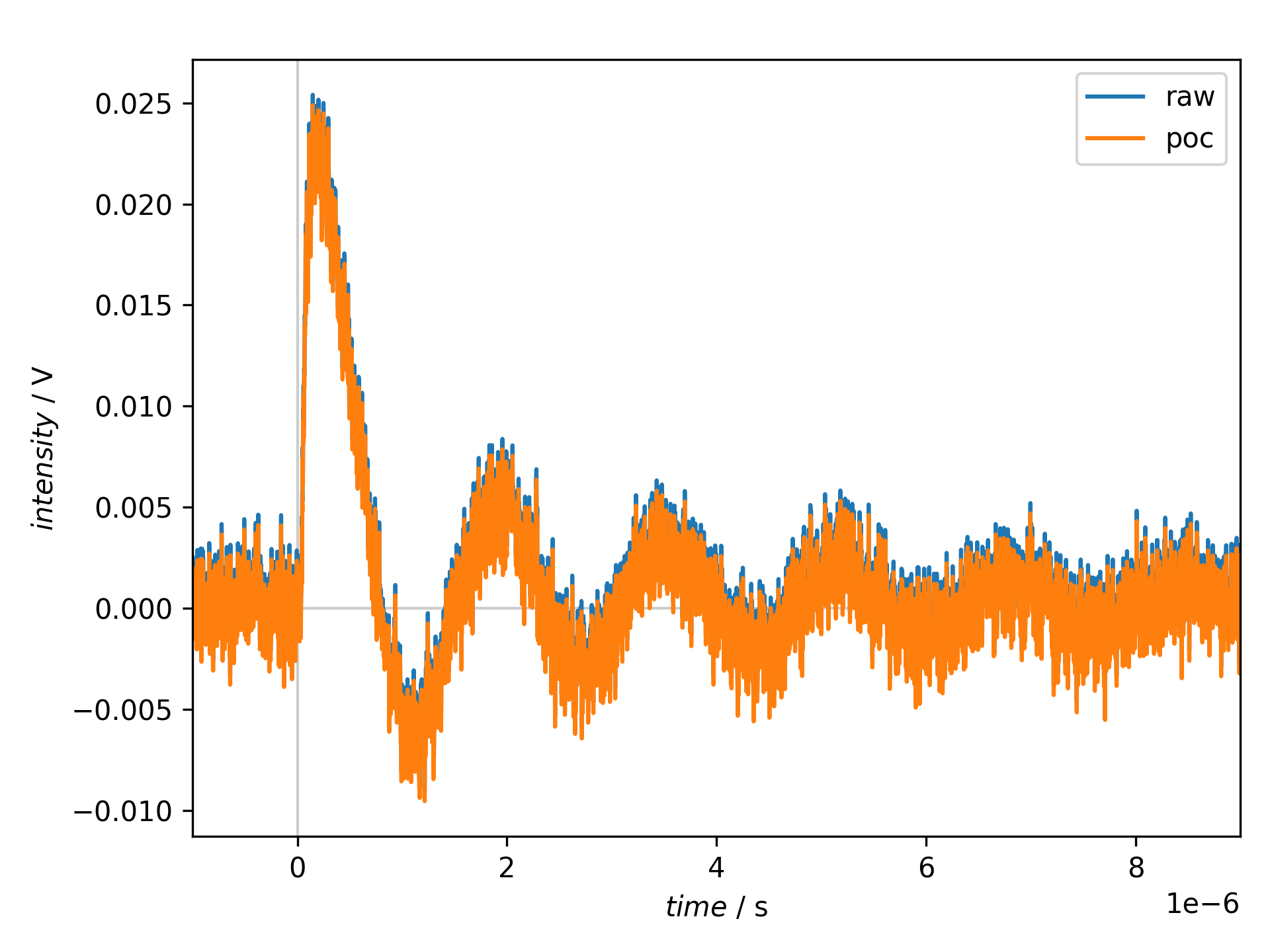You're reading the documentation for a development version. For the latest released version, please have a look at v0.2.
Pretrigger offset compensation
Classes used:
Description
tr-EPR spectra are typically recorded as full time profiles for a series of magnetic field positions, and to obtain the full kinetics, it is crucial to record the time traces starting before the laser flash.
The part before the laser flash that triggers the actual measurement is usually termed “pretrigger offset”. The first preprocessing step of raw data is hence to take this pretrigger offset and set its average to zero, i.e. average over this part of the time trace and subtract this average value from the entire time trace. This removes any DC offset of the recording.
A prerequisite of this preprocessing step is to have a time trace with a time axis starting at negative times, the trigger being defined by t = 0. If your recorded data start with t = 0 and a laser trigger at a later time t > 0, you need to determine the pretrigger part of your time trace first.
The actual processing step is a two-liner in a recipe:
37 - kind: processing
38 type: PretriggerOffsetCompensation
The other part of the recipe besides loading the data serves rather didactic purposes, such as plotting the raw and processed data and comparing extracted traces before and after processing.
Recipe
1format:
2 type: ASpecD recipe
3 version: '0.2'
4
5settings:
6 default_package: trepr
7
8directories:
9 datasets_source: ../../tests/testdata/
10
11datasets:
12 - speksim/
13
14tasks:
15 - kind: singleplot
16 type: SinglePlotter2D
17 properties:
18 parameters:
19 switch_axes: true
20 tight_layout: true
21 properties:
22 figure:
23 dpi: 300
24 drawing:
25 cmap: twilight_shifted
26 filename: raw.png
27 type: contourf
28 result: 2Dplot
29 - kind: processing
30 type: SliceExtraction
31 properties:
32 parameters:
33 position: 370.6
34 unit: axis
35 axis: 0
36 result: raw-1D
37 - kind: processing
38 type: PretriggerOffsetCompensation
39 - kind: singleplot
40 type: SinglePlotter2D
41 properties:
42 parameters:
43 switch_axes: true
44 tight_layout: true
45 properties:
46 figure:
47 dpi: 300
48 drawing:
49 cmap: twilight_shifted
50 filename: poc.png
51 type: contourf
52 result: 2Dplot
53 - kind: processing
54 type: SliceExtraction
55 properties:
56 parameters:
57 position: 370.6
58 unit: axis
59 axis: 0
60 result: poc-1D
61 - kind: multiplot
62 type: MultiPlotter1D
63 properties:
64 parameters:
65 tight: x
66 tight_layout: true
67 show_legend: true
68 properties:
69 drawings:
70 - label: raw
71 - label: poc
72 figure:
73 dpi: 300
74 filename: raw-poc-1D.png
75 apply_to:
76 - raw-1D
77 - poc-1D
Result
The recipe actually creates three figures presented afterwards.

The raw data as read, before pretrigger offset compensation. The actual signal is an oscillation (transient nutation), and the recorded data cover onyl the signal part.

The data after pretrigger offset compensation. Due to the recording scheme used with internal background subtraction already within the transient recorder, the effect is only very small and barely visible here.

Comparison of the identical time trace before (raw) and after (poc) pretrigger offset compensation. As mentioned above, due to the recording scheme used for these data, the effect is only very small.